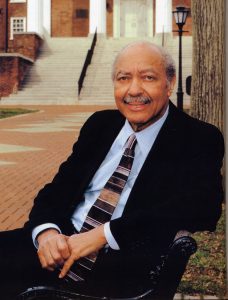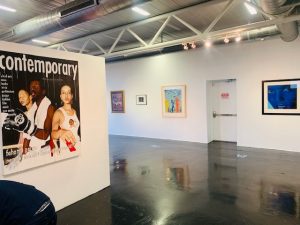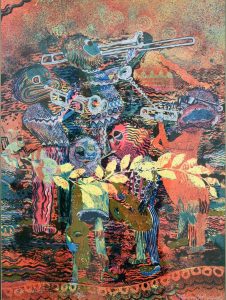
Emily Bibb, curator of the Paul R. Jones Collection of American Art at The University of Alabama, will present a Zoom talk on November 17, 2020, for patrons of a new exhibition Bibb curated for the Houston Museum of African American Culture (HMAAC).
The exhibition, Selected Works from the Paul R. Jones Collection at The University of Alabama, opened October 30, 2020, and will run through January 16, 2021. Bibb selected 40 works by artists, including Fahamu Pecou, Cedric Smith, Billy Dee Williams, Romare Bearden, Richard Hunt, Sam Gilliam, Ming Smith, Sheila Pree Bright, Whitfield Lovell, Jack Whitten, Benny Andrews, Kevin Cole, Wadsworth Jarrell and the Houston artist Lionel Lofton.
Bibb has curated and overseen a wide variety of exhibitions for the Jones Collection and the Paul R. Jones Museum, as well as other traveling shows. In her Zoom talk on Nov. 17, she will talk about Paul R. Jones and how he collected, and what was going through her mind as she curated this exhibition.
Bibb said that she selected the works for this exhibition with the Houston Museum of African American Culture in mind. “After talking with Mr. [John] Guess, the Director of HMAAC,” Bibb said, “I wanted to give a good overview of the works Paul Jones collected during his lifetime, and also show off some of our recent acquisitions, additions to the collection since it came to the university. This is a ‘Highlights’ exhibition – selections showing the breadth and depth of the Jones Collection.

“I’ve curated other ‘Highlights’ exhibitions,” Bibb explained, “and some of the pieces are the same, [but] a lot of the pieces are different each time I put one together. I’ve come to appreciate different works by artists Paul collected more work from and I wanted to highlight some of the artists who Paul really seemed to like – artists he bought multiple pieces from, even if they weren’t as famous.” She added, “Paul wasn’t making his decisions based on whether an artist was famous, and he was a big supporter of the artists in his community, even and perhaps especially those who never got famous.”
HMAAC museum staff noted that Jones’ love of photography, music, as well as his civil rights activism, are highlighted in the exhibition. Works such as “Harriet Tubman,” “Self Poison is Prison,” “Dialogue,” “Mrs. Fannie Lou Hamer,” “We Couldn’t Vote Then,” and “Rhonda’s Comment,” according to the press release, “remind us that issues presented 30-40 years ago still occupy our attention and challenge us to resolve them.”

Conversations between HMAAC CEO John Guess, Jr., and former Dean of the College of Arts and Sciences Robert Olin in 2018 resulted in the current exhibition. Guess traveled to Tuscaloosa to the Paul R. Jones Museum to meet with Olin, Bibb and Paul R. Jones Museum Director Daniel White. After scheduling delays due to the COVID-19 pandemic, the exhibition that Guess and Bibb planned has now come to fruition.
According to Guess, “This has been such a fruitful relationship with The University of Alabama, and there is of course more artwork to mine from the collection in the future to share with our audience. This exhibit is a wonderful introduction to the Paul R. Jones Collection.” The HMAAC photography exhibit, Alonzo Williams’ Everyday Strangers, will travel to the Paul R. Jones Museum in 2021.

Selected Works from The Paul R. Jones Collection of American Art at The University of Alabama is made possible through the support of The Houston Endowment, HEB and the Board of Directors of The Houston Museum of African American Culture. The mission of the Houston Museum of African American Culture is to collect, conserve, explore, interpret and exhibit the material and intellectual culture of Africans and African Americans in Houston, the state of Texas, the southwest and the African Diaspora for current and future generations.
For more information about The University of Alabama’s programs in studio art and art history, visit our Degree Programs page.